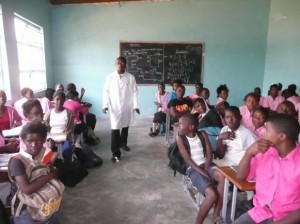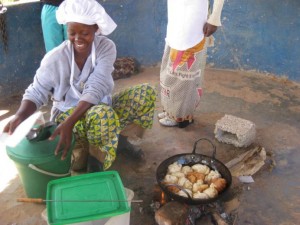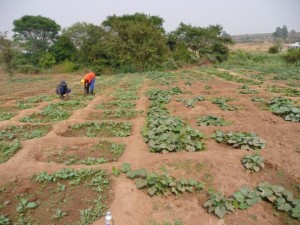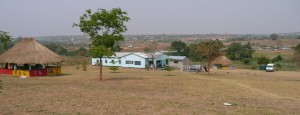We have recently returned from our annual visit to the Heal Project in Lusaka, Zambia. Our visit was overshadowed by the death of Michael, a member of their committee and prominent worker at the school. Jeannie Mulenga was very upset, and was also not at all well, largely we think, because of a change in the medication she is taking. However, we were able to visit the school.
At present 350 children attend school taking pupils up to Grade 7 in 7 subjects: Mathematics, English, Social Studies, Science, R. Education, C.T. Studies and Zambian language. This is the first year they have been teaching Grade 7. At present there are 21 pupils in this class and it is hoped to increase the number to 45 in the near future. There are 7 class teachers. Each child gets a report at end of term. The pupils are being taught using the ‘Breakthrough to Learning’ course published by Longmans. During our visit we purchased much needed teacher’s work books, exercise books, pens, pencils, chalks, etc.
The school is inspected regularly by the authorities in Zambia and always receives a good report. Results of recent examinations were very good.
Sport is an important part of the day as the children are taught in 3 hour shifts, leaving plenty of time for sporting activities. The school has three football teams and two netball teams. During the year we were able to send money for football boots and kit for which they were very grateful.
Various volunteers and students visited the Project during the year and helped in many ways. One particular student from the UK took with him several chess sets and taught a number of children how to play the game and some of them now enter competitions. Volunteers are welcome to join Jeannie and the kids for anything up to about 6 weeks. The new house has two simple rooms where volunteers can stay. Jeannie charges US $100 a week for food and accommodation.
More women from the community are taking needlework courses – every morning for 12 weeks. We watched while the teacher showed the new intake of women all the parts of the sewing machine and how to set it up ready for use. They make clothes, bags, pencil cases, etc. which they sell. They are also making school uniforms . Other crafts include, crochet, beadwork and woollen door mats using the sacking from flour bags. All are glad of the opportunity to meet with others while doing something worthwhile. We were told that several women have been able to gain employment in Lusaka as machinists.
The older girls are still making fritters and small cakes which they sell in the neighbouring area. In this way they are able to earn a little money.
There have been problems with the woodwork classes. It has been difficult to find a teacher really committed to the Project. Part of the problem is that they ask for more money the project is able to pay, and so a teacher has only been able to put in on average two days per week. The boys have, however, learned how to use the tools and are able to repair items and make beds, small stools and tables.
The new house for Jeannie Mulenga and the 30 children is finished except the electricity has not been laid on. We paid for this over a year ago, but the latest information is that holes have been dug for the poles, so hopefully, poles, wires and supply will soon be available. This does mean a new electric pump will be needed for the water supply, and all the white goods for the house, i.e., fridge, cooker and washing machine. Funds urgently needed!
The large garden is proving very beneficial. They are growing tomatoes, rape, pumpkins, aubergines, onions, red and green peppers, etc. The crops are useful for the house and school meals, and surplus produce is sold to provide an income for the caretaker and his family who live in their house in the school grounds.
A Dutch charity is building a house for the adult boys on the site. Four of the boys have recently passed their driving test and would like to become motor mechanics. However, with little education it is very difficult to obtain employment.
Thank you to all who have helped in so many ways. Your prayerful support and donations are much appreciated. Financial support is still needed. We send £2,000 per month to pay for the seven teachers, plus £350 for food. This is a big task, but it means so much to the school and community. We have seen how much the help is appreciated. As Jeannie Mulenga said it has changed their lives for ever, giving them confidence and pride in all they are achieving and to many a skill enabling them to earn a living.



